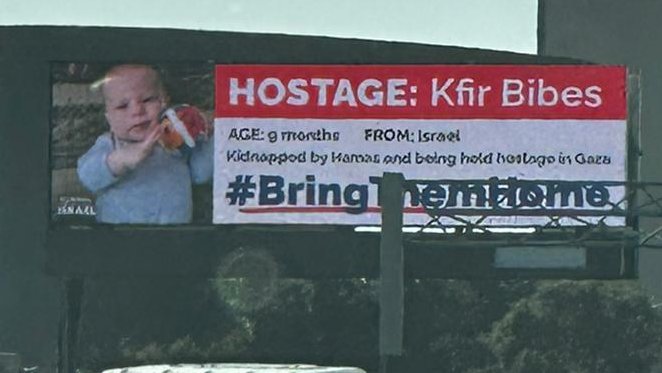
A billboard of a 9-month-old baby paired with the word – Hostage – sits above the busiest highway in Canada as part of a global campaign to show the more than 200 faces of Hamas-held hostages.
“We wanted to show Canadians the human faces of the victims. Men, women and babies murdered, kidnapped, raped, abused by these Hamas terrorists,” Jeff Ballingall, a member of Yalla!, a grassroots community group in Toronto, said.
The organization placed five billboards on Highway 401 and Highway 427 last week, and has since plastered thousands of posters on street poles and utility boxes across Canada.
These signs, which have been printed in 30 different languages and displayed across New Zealand, Spain, Greece, France and dozens more countries, were created by Israeli artists in New York.
“We discovered about innocent citizens being kidnapped – so many of them. We felt helpless, and it was terrible. We felt like we wanted to do something that we can’t sit and do nothing,” Nitzan Mintz said, recalling the chaos as Hamas, a Canadian-designated terrorist group, launched a brutal surprise attack on Oct. 7.
Mintz and Dede Bandaid had just moved to New York weeks earlier for an art residency program. “At first we didn’t know what to do,” Mintz said.
They began brainstorming with Tal Huber, a designer based in Israel, on how to quickly bring awareness to the innocent civilians captured by Hamas. The idea of milk cartons with images of missing children surfaced.
“It’s a very iconic image that everybody has in the back of their mind, either here in the U.S. or worldwide,” Bandaid explained.
Creating milk cartons from scratch would be impractical and take too long to construct, Bandaid noted, so they took the concept and pivoted to posters that could be easily plastered on streets in plain view.
On the first day, they covered Manhattan with 2,000 copies. “We were working like that until the evening, and when we got back to our apartment, we were completely broken,” Bandaid said.
They uploaded the posters in a DropBox folder and posted it on social media, so others could plaster the “KIDNAPPED” posters in their cities. From there, the campaign spread like wildfire.
“The day after, in the morning, we discovered that our folder on DropBox just crashed. So many people tried to download the files that DropBox couldn’t handle it anymore and we had to open our own website,” Bandaid said.
The guerilla campaign has been going on for nearly three weeks – much longer than Mintz had ever anticipated.
“I thought it’s a matter of one week, and then there will be so much pressure on all the governments that people will do whatever they can to release them,” Mintz said. “Look at us, we are still here, and we are fighting for them with full force and the pressure – the antisemitic pressure – is huge. I have no words to describe how much hate is directed to this campaign.”
Images and videos of people tearing down the posters in New York, Florida and London have surfaced since the campaign began. There have been no reports of posters removed in Toronto.
“Those people are still alive. They are real people,” Mintz said. “We just want those people back.”







